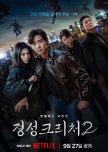
The Unnecessary Sequel That Achieved Absolutely Nothing.
Oh, where do I even begin with this mess? First off, this entire season was completely pointless. They had plenty of time to wrap everything up in the first season, but no, they just had to drag it out with a season 2 to milk more money out of everyone. And guess what? It worked! They baited all of us who actually enjoyed the first season.Surprise, surprise—season 2 was a total trainwreck, exactly like I knew it would be. The brilliance of the first season was in the 1940s setting, the depth of the characters, and how the story intertwined with real historical facts. The characters were relatable, flawed humans. But what did they do in season 2? Oh, just casually change the timeline and butcher the characters, as if that wouldn't make a difference. They only kept three characters, but that was more than enough to make me want to skip the entire thing. Yet here I am, having watched it. Why? Because Park Seo Joon’s Jang Tae Sang had me hooked. His character was the only reason I turned a blind eye to the first season’s plot holes.
Jang Tae Sang was this self-made man who put himself and those he cared about first, but had this soft, selfless side that made him a reluctant hero. He didn’t want to be the good guy, but somehow, he always ended up saving the day. I know I’m rambling, but you get the point. And then in season 2, they just turned him into another run-of-the-mill hero who helps everyone.
The whole point of season 1 was about how power corrupts people, the horrors of war, and how it all disproportionately affects women and children. Both the leads went into that hospital for selfish reasons, but ended up doing more than they intended. Romance wasn’t even a focus, and thank God, because they didn’t have much chemistry anyway. But here comes season 2, throwing romance in our faces like that’s what anyone wanted. The plot? A joke. Half-hearted at best.
And don’t even get me started on the villains. What exactly are they trying to do? Achieve immortality? Because it sure seemed like they already figured that out, but here they are, continuing their ridiculous experiments. Oh, and Lady Maeda’s weird obsession with Jang Tae Sang? Seriously? She wants revenge and to isolate him, but does it ever cross her mind that he might retaliate? But hey, that's the least of my concerns at this point.
Every time they flashback to something from season 1 or show the creature, it’s nothing but nostalgia bait for those of us who loved the first season. And the title, "Gyeongseong Creature"? Laughable, considering how little they actually showed the creature this time around. Just a bunch of overpowered super-beings running around.
Did we get answers to the questions from season 1? Nope. Not even close. What’s the point of this season, exactly? Oh right, there is none. The characters were so forgettable I couldn’t care less if they lived or died. The only redeeming thing about season 2 was the fight scenes, and even those didn’t measure up to season 1. Honestly, this season is perfect for anyone who hates period dramas and just wants to watch superhumans punch each other for hours. Enjoy!
Was this review helpful to you?
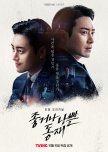
Seo Dong Jae’s Not-So-Thrilling Redemption: Realism Overshadows Suspense.
Let’s break down the so-called “pros” .A major pro is the character of Seo Dong Jae himself. He’s a true-to-life depiction of an average person, ambitious yet held back by his background—he’s not an SNU law graduate, and that fact alone stunts his career. So he claws his way up with questionable ethics and an impressive ability to brown-nose. He’s a bribe-taker and an all-around scoundrel who’s gotten high off his own scheming—because, let’s be real, it was working.
Eventually, he gets “caught” (but not really) and somehow keeps his job.
In this spin-off, we watch him grapple with the bitter reality of his past choices. He’s trying to leave his sketchy ways behind, but his past jumps back in just as he’s eyeing a big promotion. His struggles from season two get the spotlight, showing that no matter what he does, he’s not getting the payoff he expected. Nobody’s giving him the recognition he craves because of his old antics, and the show drives that point home.
Story-wise, this is more of a “mundane Monday with Prosecutor Seo Dong Jae” than any suspenseful saga. The cases are realistic but unremarkable—probably a 9/10 on the Real Life Scale for the procedural stuff.
Downside? You guessed it—there’s hardly any mystery or thrill here, despite what the promo suggests. It feels like a regular workday for Dong Jae, meaning the other characters don’t get much attention. Ironically, these other characters almost seem like the audience: they know Dong Jae is a sleazy jerk who’ll do anything to get ahead, yet they can’t fully hate him (just like us). Only those who don’t know him—or who are criminals—seem to actively dislike him.
"Dong Jae: Good or the Bastard" is so grounded in realism that it forgets it’s supposed to be a “mystery thriller.”
Viewers might find the spin-off underwhelming compared to the intense, suspenseful parent story. Did I enjoy it? Yes.
Was I disappointed because I had high expectations?Also yes, my bad! As a standalone, it’s basically a well-produced docu-drama on how being corrupt will ruin your life (I hope realism is true here too).
And hey, totally unrelated but still relevant... Lee Joon Hyuk is an absolute feast for the eyes! Seriously, that guy is an absolute eye candy, and trust me, that’s a major incentive to keep you glued to this drama!
Was this review helpful to you?
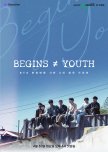
This review may contain spoilers
Mixed Feels and 2 Many Questions – Should You Wait for Season 2 to Start Season 1?
I am unfamiliar with the BTS universe, so this is my unbiased review.Firstly, regarding the storyline:
The story is compelling; it revolves around the friendship and struggles of seven teenage boys. However, the writers have chosen to subject the characters to a wide array of struggles imaginable. . This trend continues for the other characters as well. It feels excessive and like they've pushed the boundaries of trauma depiction. They could have balanced this with more moments of joy cause the way the story progressed it seems that whenever they gather and enjoy themselves, something unfortunate occurs in the next scene.
Secondly, concerning the characters:
All the characters are well-developed with unique personalities, and I genuinely appreciate each one of them. However, some characters weren't explored adequately; instead, the focus seemed skewed towards others. Surprisingly, the main character, Hwan, had limited screen time. I felt characters like Dogeon, Jooan, Hwan, and Hosu were underexplored.
Dogeon's screen time primarily revolves around his financial struggles and conflicts with his mother, with limited interaction with other characters. I wished for more depth in Dogeon's portrayal.
Jooan's decision to live with his father rather than his mother could have been explored further to understand his mindset, particularly his attachment despite the abuse—a sort of trauma bonding aspect.
Initially, Hosu played a prominent role, especially with his abandonment issues, but his character development abruptly halted.
I understand others may disagree, but I believe too much screen time was devoted to Haru without significant progress in his condition. His scenes felt repetitive, and similarly, Jeha's storyline—competing for his father's affection vis-à-vis his stepbrother and his troubling fixation on Cein—became tiresome to watch.
Cein's scenes mostly involve brooding in the burnt house or unsettling interactions with the principal and his father, which, while intriguing, felt somewhat disconnected.
I'm not suggesting that their screen time should have been redistributed, but rather that some of the series' mysteries could have been addressed or at least acknowledged. I've heard there may be another season, but without addressing these mysteries, it's hard to maintain audience interest, even if it's setting up for something significant.
In terms of execution, there are flaws, but I appreciate the non-linear storytelling approach and the episodes starting with each character's involvement in the fire. It added an intriguing layer of mystery to the series. Literally none of the mysteries were solved except Haru's.
Overall, despite my mixed feelings about the series, it has its strengths and weaknesses. I hope a second season will provide answers to lingering questions and do justice to this promising storyline.
Was this review helpful to you?
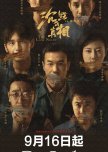
This review may contain spoilers
Emotionally Exhausting
Hey, so this is my first-ever review, and I'm putting it out there because I really think more folks should check out this drama. Hopefully, what I'm sharing is helpful, and it convinces you to give it a shot.
I'll mostly talk about Bai Yu's character, Jiang Yang.
Okay, this drama hit me hard. The story, camera work, and the acting were seriously good. The storyline was heart-wrenching, yet in a profoundly moving manner. It showed how there are very few people committed to upholding the law. In the end, justice prevailed, albeit at an immense cost.
Bai Yu's performance really touched me, especially in that wallet scene. This drama truly immersed me in all the highs and lows that Jiang Yang's character experienced. I'll be honest; I had a cathartic emotional release around episode 10. While everyone is vociferously proclaiming "HOU GUI PING WAS WRONGED," there's a deafening silence on the injustice suffered by Jiang Yang, and that's truly heart-wrenching. He sacrificed everything, even his life, for the sake of justice. Thankfully, Jiang had Zhu and Chen by his side during the most challenging moments when everything was unraveling, both literally and metaphorically.
In conclusion, I highly recommend watching it. "The Long Night" is a hidden gem; it was so captivating that I ended up binge-watching the entire series in a single day.
Was this review helpful to you?
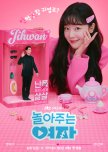
CRUSHES, CONVICTS AND CRINGE: A TALE OF SECOND CHANCES AND MISSED OPPORTUNITIES
I usually steer clear of rom-coms, but I decided to give this one a try because I'm a big fan of the male lead, Tae Goo. I'll try to give an unbiased review. Oh, and before you dive into this epic saga of a review, I’d like to apologize for the novel you’re about to read. If you were hoping for a quick, bite-sized opinion, I’m afraid you’re in for a full-course meal*Positives:*
Firstly, the concept of a former gangster starting a company that employs ex-convicts is fantastic. It’s refreshing to see a story centered around giving people a second chance and the idea that redemption is possible. The narrative explores the belief that denying criminals opportunities often leads them back to their old ways, which is a compelling angle. However, it does raise questions about the criteria for who gets a shot at "Thirsty Deer," as some individuals may not be suited for reintegration.
The characters are another highlight. I absolutely adore the male lead. His portrayal of a man seeking redemption, although somewhat cliché, is well-executed. He embodies the belief that circumstances shape people and that change is possible. Despite his gangster past, he understands that nothing can completely erase his wrongdoings, adding depth to his character.
On a personal note, Tae Goo’s voice is incredibly appealing, adding to his charm. It’s interesting to see him in a role that contrasts sharply with his shy off-screen persona. His portrayal of a man in his late 30s who awkwardly navigates crushes feels authentic and relatable.
The female lead is equally captivating. She's a kids' content creator who makes educational videos and DIY toy tutorials, primarily for children whose parents may lack the time or resources. Her content is not only creative but also deeply meaningful, reflecting her own challenging upbringing. She's open and communicative, believing in people's potential for change, much like her "oppa." Her positive outlook and willingness to see the good in people make her a relatable and inspiring character.
The secondary characters are great .They add depth and richness to the story, each with their own unique backgrounds and personalities, contributing to the overall narrative in meaningful ways. Their interactions with the main characters help to flesh out the story and provide additional layers to the plot, making the series more engaging and relatable.
*Negatives:*
For a story centered on ex-convicts, the series falls short in providing sufficient background on the Thirsty Deer employees, especially the supporting characters. It would have been more engaging to see how they struggled after being released and how Thirsty Deer helped them reintegrate into a society that often shuns them. A deeper exploration of how Ji Hwan approached them or vice versa, showing them they could change their ways and look forward to a meaningful life, would have added a lot of depth. It would have been fascinating to see the challenges Ji Hwan faced while establishing Thirsty Deer and how he worked to create a supportive environment for his employees. Is it too much to ask for a bit more backstory and character development?
Another issue is the male lead's poor communication, especially with the people who care about him, like the female lead. While his struggle with his past and the stigma of being a former gangster is understandable, his lack of openness becomes frustrating. After the big past reveal, he should have communicated better with her. It's crucial to be open with loved ones, especially when trying to move past old mistakes. His tendency to withhold information, even with good intentions, can be annoying and detracts from his character development. Communication is key, my guy!
Additional Negatives:**
The second male lead is a significant downside. Honestly, most of the time he was on screen, I felt like fast-forwarding. For a guy who works in law enforcement, he doesn't seem to believe in the concept of change or redemption, which is baffling. Isn't the whole point of punishment to encourage rehabilitation? At least he stopped being a judgmental jerk and corrected his ways in the end. Also, get a girlfriend and stop obsessing over Eun Ha!
Also the female lead's recklessness adds to the frustration. For instance, after being kicked out of her house, she chooses to stay with the male lead, whom she's only met a few times, instead of going to her friend's place. Her reason—that she didn't pick up her phone—is weak, especially since her friend is like family. It's hard to believe she wouldn't feel comfortable just showing up. Another frustrating aspect is that she doesn't know when to draw the line, especially with the second male lead. Her interactions with him often blur boundaries, making it uncomfortable to watch. It's frustrating that she doesn't establish clearer limits.
As for the villains, they're utterly pathetic. They lack any real threat or depth, making it puzzling why Ji Hwan bothers with them at all. He should just let them continue their clownish antics and let the police handle them. They don't add much to the story and come off as weak antagonists.
The plot also starts to feel repetitive after a few episodes. The characters fall into a mundane cycle—wake up, have breakfast, do something, and go back to sleep. This monotonous routine makes the story drag and loses its initial appeal.
I can’t believe they dragged everything out just to rush the ending. They didn’t even give us a decent wrap-up for Eun Ha and Ji Hwan! Are you seriously telling me he proposed and they got married offscreen? What?! And he’s still living with his gang? Where’s the privacy? Plus, he’s filthy rich—why not just get a new place for them or his gang? Eye roll.
I was hoping for some fluffy, angst-filled moments and maybe a few steamy scenes (even though I know the actor's usual restraint). Instead, I got just a few kisses, a lot of clownery, and an overwhelming amount of second-hand embarrassment. Thank God for Tae Goo and his charming presence; otherwise, I might not have made it through.
*Conclusion:*
Guys, I was here for some gangster healing, and they robbed me of it. Uhm Tae Goo in a romance doesn't happen often (this is his first), and who knows if it'll happen again. While the series had a lot of potential and some standout moments, it ultimately fell short of delivering the depth and emotional resonance I was hoping for. If you're a fan of Tae Goo like me, it might still be worth a watch, but be prepared for some frustration along the way.
Was this review helpful to you?
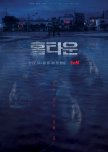
This review may contain spoilers
Review after a rewatch.
Firstly, "Hometown" gives off vibes reminiscent of the anime "Monster." However, it's disappointing that they couldn't create something comparable to the absolute masterpiece that is "Monster." The reason I thought it was similar was that I noticed parallels between Jo Kyung Ho and Johan—both proficient in manipulation with a shared indifference towards others, except for their sisters. Additionally, both experienced being orphans and endured mistreatment, etc.Now, onto the issues. The problem with the drama lies in its pacing and the insistence on maintaining suspense. This approach left viewers with little to anticipate, and some answers were abruptly presented at the end without a solid foundation. The excessive focus on the shady organization and Guru felt overdone, diverting attention from exploring other plot aspects. Furthermore, the multitude of unanswered questions weakens the overall storyline. Introducing elements without thoroughly explaining their purpose comes off as a misuse of screen time. Questions such as Im Se Yoon and Jo Kyung Ho's motives remain unclear—did she willingly give Jo Jae Young to him, or was she coerced? What were Jo Kyung Ho's intentions with Jae Young? Im In Gwan's true goal also remains elusive, leaving viewers in the dark. Additionally, the cult's objectives, seemingly orchestrated by Jo Kyung Ho, lack clarity, raising the question of what the cult gains from such actions. The accumulation of these unanswered questions feels like a missed opportunity to develop the narrative effectively.
The series could have greatly benefited from either a 20 or a 16-episode run, allowing for a more in-depth exploration of Jo Kyung Ho and Jo Jung Hyun's past. The focus should have extended to areas such as the orphanage, Kyung Ho's relationship with Im Se Yoon, and the challenges within Kyung Ho's adoptive family. Additionally, delving into Jung Hyun and her friends' involvement in the gas attack would have added complexity to the storyline. Furthermore, it remains unclear why the cult sent tapes to these individuals, especially considering Jo Kyung Ho's supposed erasure of their memories.
I heard about the scriptwriter controversy, but it felt like a lost chance. The potential was there for it to be one of the best, but alas. Perhaps, I wish for a remake with the same actors, who, despite a mediocre script, delivered a phenomenal performance. Hopefully, in the future.
Was this review helpful to you?

This review may contain spoilers
Who is the real madman?
I’m unsure where to start, so I’ll begin with the most striking feature—the cinematography. It was visually impressive, evoking a nostalgic, old-film feel, which I assume was the intended effect. No surprises there, though I did wish for a bit more clarity, perhaps because I wanted a clearer view of Zhu Yi Long’s handsome face.The lack of music was another effective choice, heightening the tension and enhancing the suspenseful atmosphere of the film.
The performances of all the actors were good, completely immersed in realism.
I also appreciated the timing of the story, set between the monsoon season and the onset of winter. The rain, combined with the crime, created a rich and atmospheric tone that worked well.
Regarding the main plot: I’d set aside the obvious elements, like the murders and investigation, and focus on where the story takes a more surreal turn. To me, the protagonist is disturbed by how everything falls into place so perfectly, and we, as viewers, share in that discomfort. While the simplest explanation might be the right one, the protagonist struggles to accept it.
He seems overwhelmed and stressed, especially with the pressure of expecting a child who might have a genetic disorder. His downward spiral appears to start after his superior questioned him about a Grade 3 Merit Certificate, which he thought he had already earned, but only receives after solving the case.
The film's issue lies in its synopsis—"he unravels dark secrets of the villagers"—because these secrets aren’t truly dark. Affairs and cross-dressing are secrets, but they aren’t life-altering or sinister. There is, however, one "dark secret"—the protagonist’s certificate and the puzzle pieces he flushed down the toilet. Clearly, something is wrong with him. The film awkwardly hints at a past event, suggesting his mind has tried to bury that memory. At least, that’s my interpretation.
As I mentioned earlier, his decline seems to begin with the murder, the certificate, and the pregnancy, and it seems to halt (hopefully) with the murder solved, the certificate obtained, and the healthy birth of the baby.
Ultimately, I suppose what matters is that everything ends up okay for the protagonist... Nothing really new but at the same time not a bad one either.
Was this review helpful to you?
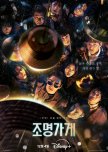
I have no complaints
Light Shop is a masterpiece, thanks to its incredible script and direction. This isn’t just a horror drama—it’s a deeply emotional journey that leaves you questioning everything even after it ends. The twists don’t just surprise you; they leave a heavy feeling in your chest that’s hard to shake off. And the amount of detail and foreshadowing it had was absolutely mind-blowing—every little moment seemed to have a purpose, adding layers to the story that kept you thinking long after it was over.But what truly makes Light Shop special are the characters. They’re not just there to move the story along—they feel real. You care about them, fear for them, and at times even hate them. (If you know, you know.) The way their stories connect with the shop’s mystery is brilliant. And the acting? It’s so natural, it doesn’t feel like a performance. Every emotion feels raw, and it draws you into their world of fear and fragile hope.
The pacing might be slow, but it’s exactly what makes the show so gripping. It feels like waiting for a storm you know is coming but can’t escape. Every scene builds tension, and when the truth is revealed, it hits like a punch in the gut.
What stays with you are the themes—regret, redemption, and the weight of choices we can’t undo. They creep into your thoughts, making you reflect on your own life without even realizing it. It’s rare for a horror show to make you feel this way, but Light Shop does it so effortlessly.
And then there’s Kang Full. His stories always have an ending in mind, and that’s what makes them unforgettable. After all, if the ending falls flat, what’s the point of everything else?
This isn’t just a show to watch—it’s something you feel, something that lingers with you long after it’s over. It stays in your mind, creeping in when you least expect it. For me, Light Shop is more than a show—it’s art.
Was this review helpful to you?

 2
2






















